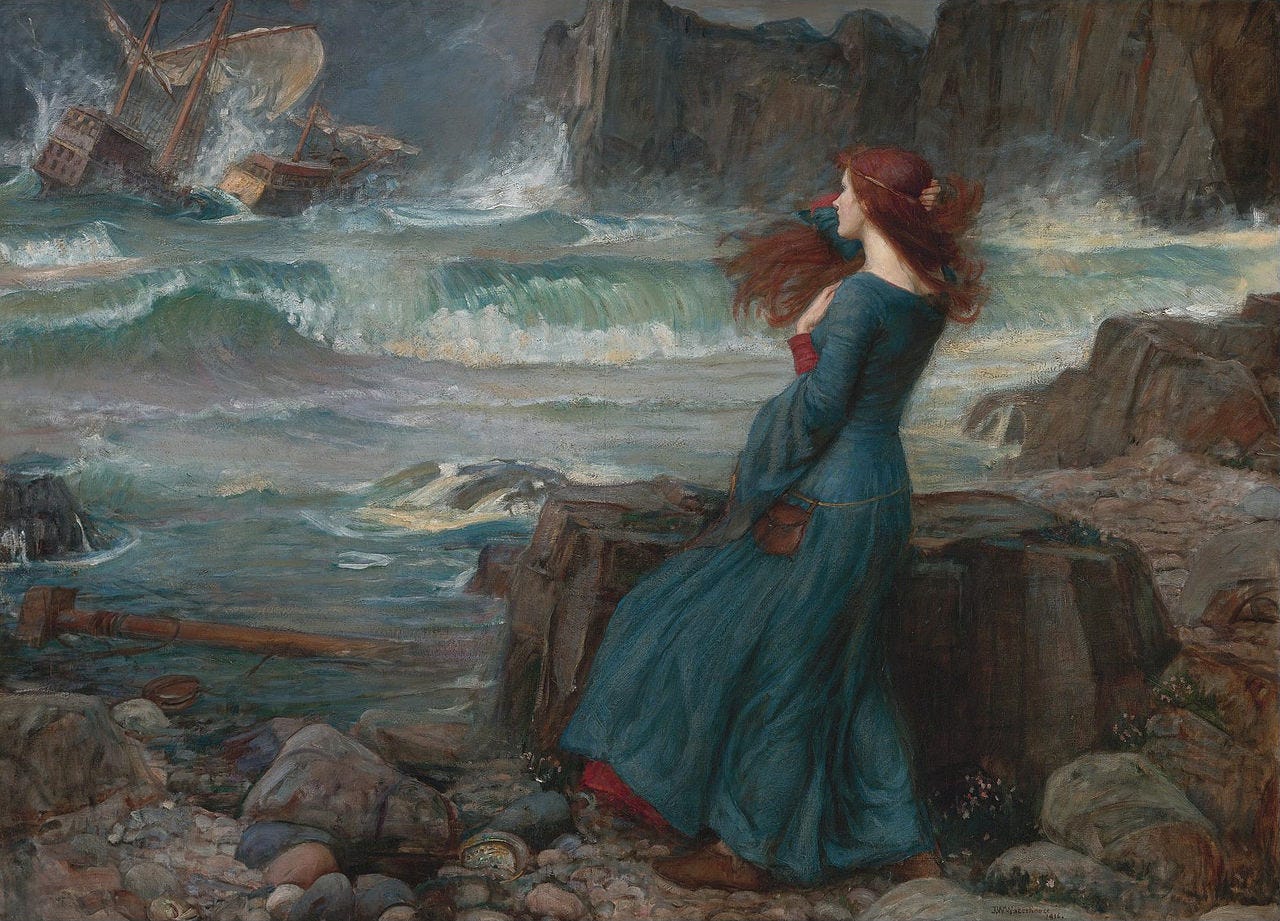The Tempest
Hell is empty and all the devils are here.--William Shakespeare, The Tempest
There are two forms of knowledge available to Prospero. One is the liberal arts, which inspires all that highfalutin Renaissance speak and quasi-steampunk machine-science. And there is magic. For most of his life, Prospero went with the knowledge that produces governors and refines Princes. He had a nice little life set up for him as the Duke of Milan.
That was until he was usurped by his trifling brother Antonio who convinced the King of Naples, Alonso, and his brother Sebastian to dispose of Prospero. The poor Prospero was dropped on a remote island with his baby daughter Miranda. They survived on that rock for twelve years. This is mostly because Prospero switched his mode of being from the book-knowledge school of liberal arts to the hard-knock school of magic.
The people of Shakespearean time thought there was another realm beyond the realm of nature. A realm filled with spirits working wonders and a hierarchy of devilish and celestial beings ascending from Satan to the Good Lord. This is what the De Occulta Philosophia preaches.
The eyes wide shut Prospero is a dupe who gets tricked into losing everything he worked for. The eyes wide open Prospero has unleashed the bastards of his mind and commences the play by summoning a storm and stranding those who stranded him. Much like Shakespeare who summons the audience with his pen and farewell tour.
There has been a transition. Prospero the Man has ended. Prospero the Summoner has begun. The key to this transition is the spirit Ariel who amplifies Prospero’s will with his magical powers. The island that they are staying on has a weird way of paralleling and inversing the laws of mastery and rule.
The innocent Prospero lands on the island with his daughter Miranda. The two previous inhabitants of the island were the witch Sycorax and her son Caliban. Sycorax was exiled from Algiers for practicing witchcraft and sleeping with the devil. Her son, Caliban, is the missing link between Darwin’s man and Darwin’s monkey. Miranda is a divine princess whose beauty and sophistication is a targeted marital strike against Ferdinand, son of the King of Naples.
Also on the island, is the aforementioned Ariel who is being tortured by Sycorax since he refused to do her evil bidding. When Ariel is saved by Prospero, he agrees to do his mostly-big picture-good bidding because Prospero also includes a termination clause for a job well done.
Ariel speaks in delicate verse, is a representation of fire and air, concord and music—loyal service. He can also command the tides and manipulate the spirit world, which is nice. Caliban is of the earth, a man-monster associated with discord, drunkenness, and rebellion. They taught him to speak and he loved to curse. Is it any wonder who you want in your inner circle and who you want fetching wood and water?
In Caliban’s defense, he was raised in the laissez-faire school of island savagery. He was actually an all-right guy in the beginning because he shared his knowledge of the island which included mapping the fresh springs, brine pits, barren places, and fertile ones. He fucked up when he expected Prospero to share Miranda. Sorry Calliban buddy, but this isn’t the same island as when those whaling ships would land on Nuka Hiva.
Getting back on track after throwing out a Typee reference, the point is that if you want anything done you got to wake up the Little Bastard of your mind. Hell is empty and the devil is a homunculus in your brain.
Prospero doesn’t become a sorcerer he unleashes one.
Prospero arrives on an island and using knowledge gained from his books frees the imprisoned spirit Ariel who, in return, serves Prospero and summons the tempest. Who is Ariel but Prospero’s Little Bastard? What then is this book you’re reading but one of Prospero’s books showing you how to release our own Ariel.
You really do have powers beyond imagination, but they’re not yours to command, only release. Your Little Bastard is really just an obstructed process seeking its natural expression.
Jed McKenna, Jed Talks #2
William Faulkner and his demons. Socrates and his daemon. Dante and his beatific muse. Once you figure that out then…well…
More servants wait on man
Than he’ll take notice of
George Herbert, Man



Gorgeous piece. The only reason I’m not a paid subscriber yet is I’ve established a moratorium on doing so until next year because Substack is addictive and I know it. So very soon though.
You are pretty amazing at this.